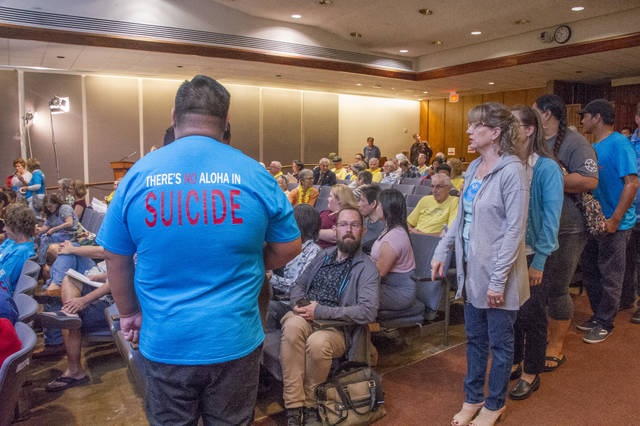State lawmakers delay vote after hours of testimony on medically assisted death

CRAIG T. KOJIMA / CKOJIMA@STARADVERTISER.COM
Rep. Scott Nishimoto, left, and Rep. John Mizuno listened during today’s public hearing.

CRAIG T. KOJIMA / CKOJIMA@STARADVERTISER.COM
Strider Didymus testified against a bill hat would allow terminally ill adults to end their lives with a lethal dose of prescription medication.

CRAIG T. KOJIMA / CKOJIMA@STARADVERTISER.COM
A crowd filled the room for today’s House Health and Human Services and Judiciary Committees public hearing.



More than 100 people testified over four hours for and against a bill that would allow terminally ill adults to obtain prescriptions for lethal doses of medication.
Two key House committees decided to postpone a vote on House Bill 2739 until Wednesday at 12 p.m. after hearing often emotional testimony.
House Health and Human Services Chairman John Mizuno said the committee members needed additional time to work through safeguards and concerns raised during the hearing.
Supporters of the bill included terminally ill patients and relatives along with health-care workers who testified that mentally competent individuals should be able to have the option to end their lives peacefully and with dignity rather than suffer from painful illnesses.
Retired lobbyist John Radcliffe, who was diagnosed in 2014 with inoperable cancer in multiple organs, testified in support, calling medical aid in dying much needed and widely supported by the general public.
He said he has outlived his prognosis by 20 months so far and last week completed a 58th round of chemotherapy.
Don't miss out on what's happening!
Stay in touch with breaking news, as it happens, conveniently in your email inbox. It's FREE!
“I am hoping to go where it takes me, but my prognosis remains six months or less. There are good days and bad, but mostly good,” Radcliffe said. “What would be bad is if this option for a peaceful death not be approved.”
Opponents, meanwhile, included those identifying as believers of various faiths who argued that life should be treated as a gift and respected. Some health-care workers also testified in opposition, warning that patients may end their lives prematurely and saying pain relief is already available through hospice and palliative care.
“Doctors should heal, not kill,” Mary Smart with the Hawaii Federation of Republican Women testified in opposition. “This is mercy killing and euthanasia.”
Under the bill dubbed the Our Care, Our Choice Act, patients with less than six months to live would have to submit two verbal requests a minimum of 15 days apart and one written request for a lethal prescription to the physician or advanced practice registered nurse who is providing them care.
Two health-care providers would need to confirm the patient’s diagnosis, prognosis, competence and that the request is voluntary.
The written request would need to be signed and dated by the patient and at least two witnesses who can attest the patient is of sound mind, is acting voluntarily and is not be coerced. A patient would have the right to rescind a request at any time, regardless of their mental state.
The bill also calls for criminal penalties for tampering with a patient’s request for a prescription or coercing a patient to request a prescription.



